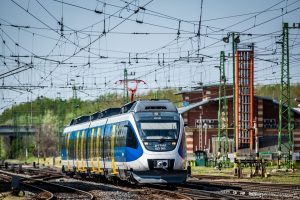 MÁV-Start has launched a public procurement procedure for the acquisition of 50 battery-electric trains which will be gradually delivered from 2023 to 2029. The contract will have a duration of 96 months. The project will be funded by a loan.
MÁV-Start has launched a public procurement procedure for the acquisition of 50 battery-electric trains which will be gradually delivered from 2023 to 2029. The contract will have a duration of 96 months. The project will be funded by a loan.
June 22 is the deadline for bids submission, and the selected candidates will be announced on 6 August 2020.
Under the tender requirements, the Hungarian railway operator will purchase 20 trains with 200 seats each and 30 trains with 150 seats. The 20 200-seats trains will be firstly procured which are scheduled to be delivered in 2023-2024.
Seven award criteria with a maximum weighting of 1200 points are included in the tender requirements:
- A general warranty period for min.24 and max. 36 months (weighting: 50)
- A traction battery warranty for 120-144 months (weighting: 50)
- Large battery range of 80-120 km at a speed of 100 km/H (weighting: 50)
- Low floor (≤750 mm) passenger compartment ratio 40-75% (weighting: 50)
- Synchronous operation insurance with 415 series motor trains operated by MÁV-Start (weighting: 25)
- A maximum capacity of 200-220 seats per train for the 20 trains (weighting: 25)
- A maximum capacity 150-165 seats per train for the 30 new trains (weighting: 25)
The battery-electric trains will be able to run on both the lines electrified at 25kV 50Hz and non-electrified lines, using the battery power. The new trains are MÁV-Start solution for non-electrified lines and diesel traction removal on the selected lines.
The first 20 battery-electric trains will enter services on the Line 29 and the next batch of trains will run on the Budapest-Lajosmizsei line which is currently in reconstruction works, with electrification works split into several phases, while battery power is to be used on the non-electrified sections.
MÁV-Start also intends to deploy the new trains on the other railway lines such as Győr-Szombathely, Miskolc – Ózd, Esztergom – Komárom, Győr – Keszthely – Kaposvár – Pécs and Szolnok – Hatvan – Somoskőújfalu lines.
“With the acquisition of new vehicles, transport services will be improved, while the railway transport offers a more environmentally friendly alternative to road transport. Within a few years, the trains will carry passengers everywhere in the suburbs of Budapest, and their expansion would certainly find a favorable perception in long-distance and regional traffic,” said László Mosóczi, State Secretary for Transport at the Ministry of Innovation and Technology.
The new trains will replace the extremely costly and polluting diesel trains with the new zero-emission rolling stock. The introduction of the new fleet significant environmental energy efficiency improvement will be achieved. According to company’s calculations, significant direct cost savings of a total of HUF 3.6 billion (EUR 10.18 million) can be expected on an annual basis. EUR 206,500 (HUF 7.3 million) is the average saving for one train.
Besides environmental features, the new trains will provide passengers a high-level comfort and safety.
Share on:



